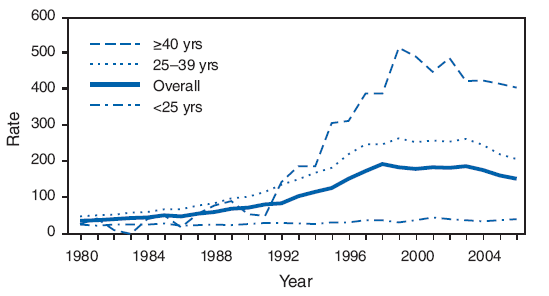Persons using assistive technology might not be able to fully access information in this file. For assistance, please send e-mail to: mmwrq@cdc.gov. Type 508 Accommodation and the title of the report in the subject line of e-mail.
QuickStats
From the National Center for Health Statistics
Rate* of Triplet and Higher Order Births, by Age Group of Mother --- United States, 1980--2006

* Per 100,000 live births.
Triplet and higher order births have greater risk for preterm birth, low birthweight, and infant mortality than singleton and twin births. The rate of triplet and higher order births increased approximately 400% overall from 1980 to 1998, with the greatest increases among mothers aged 25--39 years and ≥40 years. After peaking in 1998 at 193.5 per 100,000 live births, the overall rate decreased to 153.3 in 2006. This decrease largely resulted from a decrease in the rate among mothers aged 25--39 years, from 276.9 per 100,000 live births in 1998 to 207.8 in 2006. During this period, the rate for mothers aged ≥40 years also declined.
SOURCE: Martin JA, Hamilton BE, Sutton PD, et al. Births: final data for 2006. Natl Vital Stat Rep 2009;57(7). Available at http://www.cdc.gov/nchs/data/nvsr/nvsr57/nvsr57_07.pdf.
The figure above shows the rate of births, triplet and higher, by age group of mothers in the United States, during 1980 through 2006, based on data from the 2009 National Vital Statistics Report for that period.
The rate of triplet and higher births tripled overall from 1980 to 1998, with the greatest increases among mothers aged 25–39 years and >40 years.
After peaking in 1998 at 193.5 per 100,000 live births, the overall rate decreased to 153.3 in 2006. This decrease largely resulted from a decrease in the rate among mothers aged 25–39 years from 276.9 per 100,000 live births in 1998 to 207.8 in 2006.
The rate for mothers aged >40 years also declined.
Use of trade names and commercial sources is for identification only and does not imply endorsement by the U.S. Department of
Health and Human Services. |
All MMWR HTML versions of articles are electronic conversions from typeset documents. This conversion might result in character translation or format errors in the HTML version. Users are referred to the electronic PDF version (http://www.cdc.gov/mmwr) and/or the original MMWR paper copy for printable versions of official text, figures, and tables. An original paper copy of this issue can be obtained from the Superintendent of Documents, U.S. Government Printing Office (GPO), Washington, DC 20402-9371; telephone: (202) 512-1800. Contact GPO for current prices.
**Questions or messages regarding errors in formatting should be addressed to mmwrq@cdc.gov.Date last reviewed: 4/30/2009


